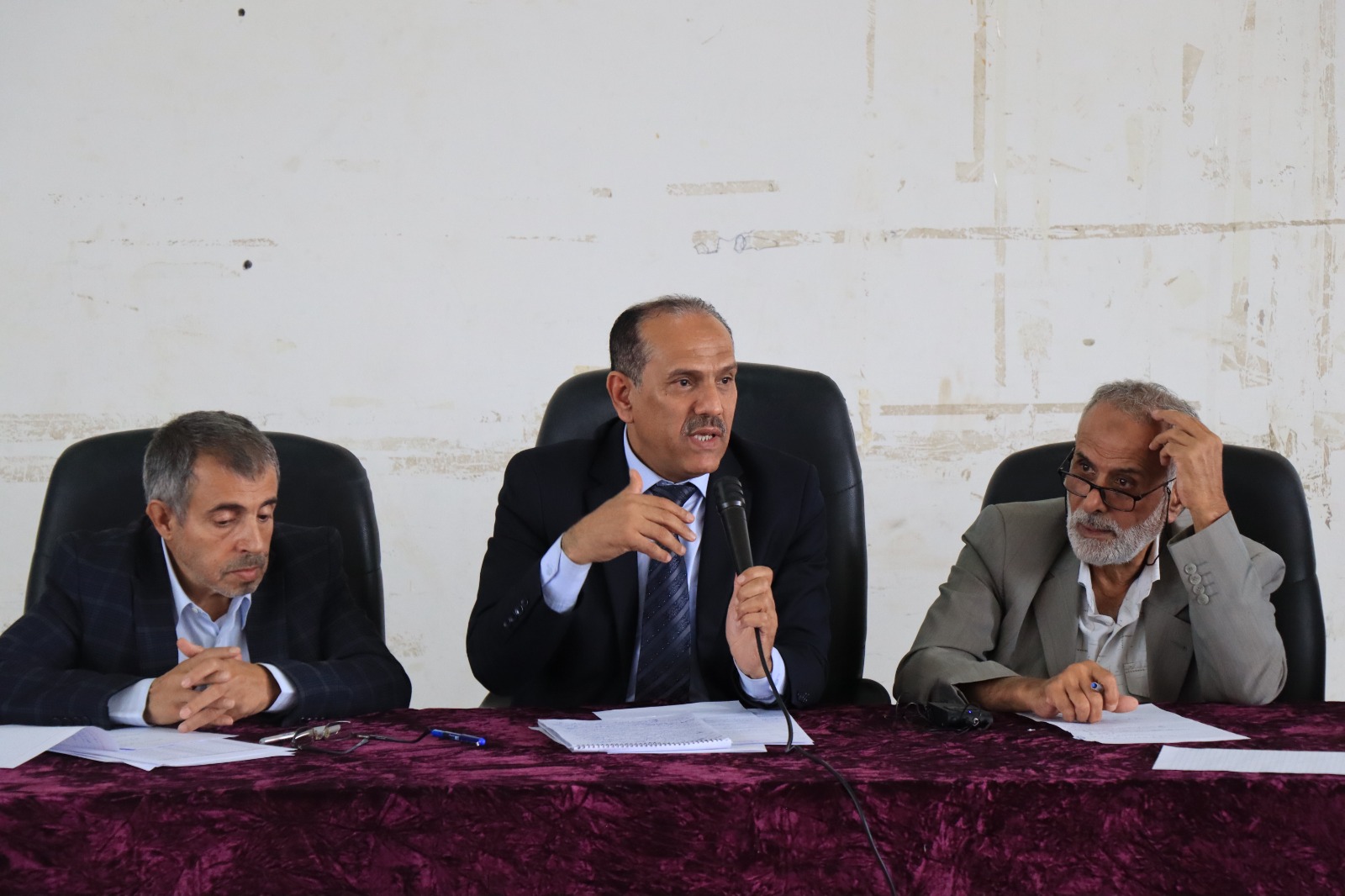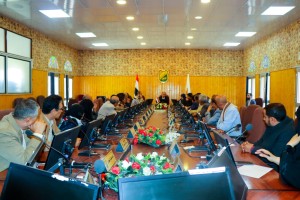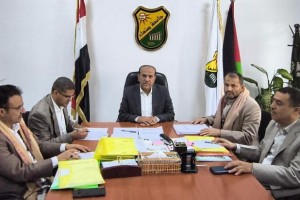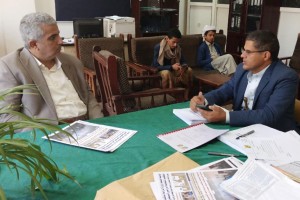University Rector Meets with Deans, Vice-Deans, and Department Heads

Sana’a University held a comprehensive meeting on Saturday, chaired by the University Rector, Prof. Mohammed Ahmed Al-Bukhaiti, and attended by the Vice-Rector for Academic Affairs, Prof. Ibrahim Al-Mutaa; Vice-Rector for Student Affairs, Prof. Mohammed Shukri; Assistant Vice-Rector for Postgraduate Studies, Prof. Huda Al-Imad; the Rector’s Assistant for Media Affairs, Mr. Adel Al-Habbabi; and the University’s General Secretary, Mr. Iskandar Al-Maqaleh. The meeting included the deans of faculties, vice-deans, and department heads.
During the meeting, Prof. Al-Bukhaiti presented the outlines of his strategic vision and action plan, emphasizing that Sana’a University represents a national responsibility shared by all. Its far-reaching impact—locally, regionally, and internationally—reflects its vital role in society.
“We are here to carry forward a distinguished legacy,” he stated, “one in which the university made significant strides under challenging conditions, guided by the leadership of former Rector Prof. Al-Kasem Abbas.” He expressed appreciation for previous university leaders whose foundational efforts have paved the way for ongoing progress and excellence.
He underscored the collective national and moral duty toward the educational mission at every level, noting that despite Yemen’s current hardships, remarkable achievements have been made—something not surprising for Yemen, the land of faith and the Prophet’s supporters. He emphasized that high-quality education is integral to Yemen’s authentic identity—a trust that must be preserved through continued innovation and advancement.
Prof. Al-Bukhaiti called for a collaborative and integrated approach, driven by mutual respect, devotion, and teamwork. He emphasized that excellence is achieved not by speculating on intentions but through measurable competence and field performance, which are the true measures for evaluation and contribution.
He urged all faculty deans, vice-deans, and department heads to approach their work with a heightened sense of responsibility, ensure educational quality, and make maximum efforts to preserve achievements and move forward with improvement and development. This will be done by simplifying procedures and avoiding negligence and delays—especially regarding student documentation—and upholding efficiency as a benchmark for the university’s community service.
“We aim to manage our resources effectively and transparently,” he said, “and to enhance university revenue through structured initiatives, including offering our institutional expertise to both public and private institutions and the wider community.”
Among his stated priorities were academic staff rights, including fair payment for teaching hours. He also urged efforts to strengthen faculty performance through well-equipped laboratories, workshops, and administrative infrastructure, in addition to addressing the needs of the administrative workforce. Furthermore, he stressed the need to introduce well-researched, specialized academic programs aligned with labor market demands, supported by the necessary infrastructure and qualified staff.
Prof. Al-Bukhaiti outlined a new strategic direction, positioning the university as a premier center of expertise, providing services to state institutions and even the private sector with a view to serving society and generating new income streams for the university. A comprehensive guidebook will be developed to show the university’s capabilities through its faculties and research centers.
Following fulfillment of essential obligations, he added that focus will shift to improving faculty and staff welfare, particularly in terms of financial entitlements and adequate health insurance coverage.
He emphasized that improving the quality of education starts with building on existing successes and equipping students with practical, market-relevant skills, achieved through well-prepared lectures and instructional quality.
While the university has made commendable progress in automating the examination process, Prof. Al-Bukhaiti noted that areas not requiring automation will be reassessed under specific criteria.
He emphasized the need for increased effort and accountability across faculties: “We will conduct regular and unannounced visits to classrooms and facilities to evaluate performance and service quality. Our standard will be merit and capability, ensuring sustained excellence through unified, team-driven efforts.”
During the session, deans, vice deans, and department heads voiced their concerns, aspirations, and developmental plans for their respective faculties. They commended the university’s achievements in national institutional and programmatic accreditation and expressed their commitment to advancing these efforts in a manner befitting Sana’a University as Yemen’s leading academic institution.
Discussions touched on the challenges facing branch faculties, calling for practical solutions. Participants also suggested revising the system for calculating academic staff teaching hours and proposed mechanisms to accommodate students unable to pay tuition fees in full before exams.
Further suggestions addressed the conditions of outdated faculty facilities, such as the Faculty of Media, which requires funding for a new building, and the needs of emerging faculties like Veterinary Medicine, which seek stability for newly appointed instructors.
Discussions extended to tackling duplication in some graduate programs and foundational disciplines, reconsidering the academic calendar, activating cultural activities, and urgently improving staff health insurance services.
Other points included the requirements for graduation projects, the condition of lecture halls, and the need for strict adherence to university policies and regulations.
Discover more from Sana'a University
Subscribe to get the latest posts sent to your email.













